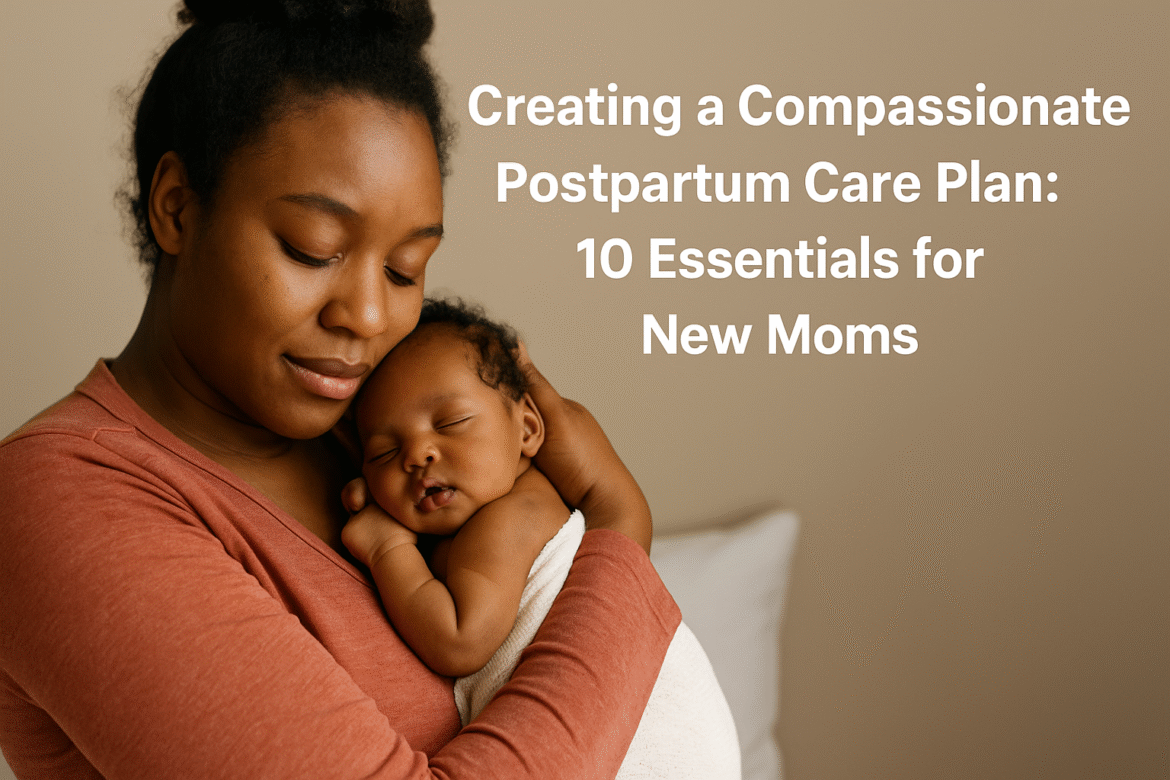Welcoming a new baby is joyful, but it also comes with physical exhaustion, emotional changes, and the mental weight of transition. Many mothers feel unseen and unsupported in those early weeks.
That’s why having a thoughtful, compassionate postpartum care plan can be a lifeline, helping new moms heal, adjust, and feel cared for on every level.
A strong postpartum care plan doesn’t just focus on recovery after childbirth; it honors the mother’s journey. From emotional validation to physical rest and community connection, these ten essentials are designed to guide you in creating the supportive foundation every mom deserves.
1. Emotional Support & Validation

Managing postpartum emotions can be quite unpredictable. It’s acceptable to feel overwhelmed, nervous, or teary-eyed at one point and amazed by your child at another. The most beneficial thing is being able to cry freely, talk freely, and feel completely seen without fear of criticism.
In the postpartum care plan, it is important to include a solid support network. Promoting candid dialogue with a partner, friend, or therapist can help a mother feel more rooted. Online or in-person postpartum support groups can serve as a secure environment for connecting and realizing that you’re not the only one experiencing these emotions.
2. Physical Recovery After Childbirth

Postpartum recovery looks different for every woman. From vaginal birth to C-section recovery, the body needs time, nourishment, and patience to heal. The postpartum care plan should make room for gentle movement, iron-rich meals, and consistent hydration to support tissue repair and energy levels.
Though it is frequently disregarded, rest is an essential component of healing. Moms can feel more at ease as their bodies heal by taking even brief naps, minimizing physical strain, and applying supportive equipment like belly bands or perineal sprays.
3. Monitoring Maternal Mental Health

Maternal mental health is just as important as physical health. Up to 1 in 7 mothers experience postpartum depression or anxiety, yet many suffer in silence due to stigma or fear of being judged. Recognizing symptoms early, like constant sadness, guilt, or lack of interest, can make a difference.
Including mental health check-ins as part of the postpartum care plan ensures that emotional struggles aren’t brushed aside. Professional help from a therapist or mental health provider can bring clarity and comfort, validating what the mom is experiencing and offering tools to cope.
4. Practical Help with Daily Responsibilities

Caring for a newborn brings immense love, but it also demands your time, energy, and attention in ways that can feel all-consuming. Cooking, cleaning, and even showering may feel impossible. One of the most compassionate forms of support is simply helping with everyday tasks, no grand gestures required.
Daily responsibilities can be lessened with the help of a care calendar as part of the postpartum care plan that arranges grocery shopping, laundry assistance, and meal deliveries.
When friends or family are far away, structured support can also be given by postpartum doulas or part-time assistants. These professionals bring not only skill but also a calm, grounding presence that reminds new mothers of their strength. Their inclusion in the postpartum care plan support can make the transition into motherhood feel more intentional, supported, and beautifully human.
5. Postpartum Nutrition Strategy

Eating well after childbirth helps fuel the body and stabilize mood. A diet rich in iron (like spinach or legumes), protein (chicken, eggs), and omega-3s (salmon, chia seeds) supports hormone regulation and physical repair.
Don’t forget hydration in the postpartum care plan, especially when breastfeeding. Simple additions like herbal teas, bone broth, or infused water can make it easier to stay hydrated throughout the day, even in the middle of chaotic newborn care.
6. Sleep Protection & Rest Routines

Newborn sleep is unpredictable, but that doesn’t mean moms should sacrifice all their rest. Including a sleep-protective plan in the postpartum care plan means creating opportunities to nap, shifting night duties with a partner, or even accepting help during early mornings.
Poor sleep increases the risk of postpartum depression and anxiety. White noise, dim lighting, and screen-free wind-down are all gentle nighttime routines that help teach the body to rest, even in small doses.
7. Gentle Movement & Physical Activity

Once cleared by a healthcare provider, your postpartum care plan can include light movement that can aid both physical and emotional healing. A short daily walk, gentle yoga, or even stretching while holding your baby can release tension and boost mood-regulating endorphins.
Reconnecting with your body is the aim. Moving in ways that feel good helps rebuild strength, relieve stress, and restore a sense of control and agency in your healing journey.
8. Creating Self-Care Rituals

Self-care can feel out of reach, but small moments add up. Five minutes for a face massage, music while breastfeeding, or a journal entry during naptime can shift a mom’s entire mood and energy.
Including self-care in a postpartum care plan reminds moms that their needs still matter. It’s not about luxury; it’s about self-preservation and keeping your cup just full enough to pour back into your family with love.
9. Setting Healthy Boundaries

New moms often feel pressured to accommodate visitors or respond quickly to messages. But recovery requires protecting energy, which should be included in the postpartum care plan. Creating a boundary plan, such as “no visitors the first week” or “phone-free rest windows,” gives moms space to breathe.
Boundaries aren’t selfish; they’re strategic. They help moms avoid emotional burnout and feel more in control during a time when so much else feels unpredictable.
10. Building Connection with Other Moms
There’s power in shared experience. Talking to someone else who understands sleepless nights or intrusive thoughts can provide relief that even the most loving partner may not offer. The postpartum care plan should accommodate orders for connecting with new mothers like you.
Encourage connecting with local mom circles, postpartum classes, or online communities. Genuine peer support normalizes the highs and lows of motherhood and helps reduce feelings of isolation. Join our page for fellowship with other amazing mothers going through the same phase.
Conclusion
Postpartum care is not a luxury; it’s an absolute necessity. When a mother takes time to care for herself with kindness and intention, she’s not only allowing space for healing but also building a stronger, more resilient foundation for the journey ahead.
Every small act of support and self-nourishment adds up, creating stability in a time that often feels unpredictable.
By honoring both physical and emotional needs, a compassionate care plan becomes more than a checklist; it becomes a daily reminder that a mother’s well-being matters deeply. Prioritizing rest, connection, and self-compassion is how a new mom not only recovers but also begins to rediscover her strength with confidence and clarity.
We love to see the smiles on your face. Visit our website and read our recent blog on hormone treatment options for new mothers. Join our free newsletter for more insightful topics surrounding postpartum and motherhood. We are your greatest cheerleader!


